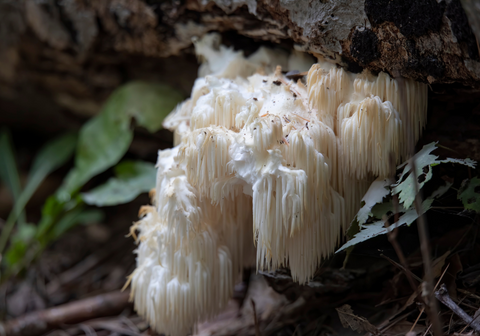Introduction: Exploring Lion's Mane Mushroom
Lion's Mane Mushroom, scientifically known as Hericium erinaceus, is a fascinating fungi that has gained significant attention in recent years, for its brain-boosting properties. While it may seem like a newcomer to the world of cognitive enhancement, this mushroom has a rich history of use in traditional medicine, particularly in Asian cultures.

Historical Use
The use of Lion's Mane Mushroom can be traced back centuries in countries like China and Japan, where it was prized not only for its culinary qualities but also for its believed medicinal benefits. Traditional herbalists often employed Lion's Mane to treat a range of ailments, with a particular focus on digestive and cognitive health. In more recent times, Lion's Mane has found its place in the modern world of nootropics, substances known for their cognitive-enhancing properties.
The Nootropic Revolution
The term "nootropic" refers to substances that have the potential to enhance cognitive function, including memory, focus, creativity, and overall mental clarity. Nootropics have recently gained popularity as people seek ways to optimize their cognitive abilities, both for everyday tasks and to support long-term brain health. Other nootropics include ashwagandha, rhodiola and caffeine. This nootropic revolution has led to a growing interest in natural alternatives like Lion's Mane Mushroom. It also encourages less dependence on pharmaceuticals to achieve desired effects.

Caffeine, one of the world's most popular nootropics.
Lion's Mane Mushroom: A Natural Nootropic
Nootropics can be natural or synthetic, both being available over the counter. Lion's Mane is one of the few mushrooms considered a nootropic because it primarily works on the brain and enhances cognitive function. It contains a variety of bioactive compounds, including polysaccharides, hericenones, and erinacines, which promote the growth of new nerves and neurons while protecting them from future damage. Unlike synthetic nootropics, Lion's Mane is a naturally occurring substance, making it an attractive option for those seeking brain-boosting solutions with fewer potential side effects.
Neurogenesis and Lion's Mane
One of the most exciting aspects of Lion's Mane Mushroom is its ability to promote neurogenesis, the process by which new brain cells are generated. Research have uncovered that Lion's Mane contains compounds that stimulate the production of nerve growth factor (NGF), a protein essential for the growth, maintenance, and repair of neurons. This neurogenic property has sparked considerable interest in Lion's Mane as a potential treatment for neurodegenerative diseases and cognitive decline associated with aging. It can also help in the case of traumatic brain injuries. For the average healthy person, it can help hone in their focus to get daily tasks done.

Enhancing Cognitive Function
Numerous studies have explored the cognitive benefits of Lion's Mane Mushroom. These studies have shown promise in improving memory, both short-term and long-term, enhancing focus and concentration, and increasing overall mental clarity. While research is ongoing, the preliminary findings suggest that Lion's Mane is a promising natural solution for those looking to optimize their cognitive performance. These effects are credited to Lion’s Mane’s neurogenic properties.
Neuroprotective Properties
Age-related cognitive decline is a growing concern for our aging population. Lion's Mane Mushroom is a promising treatment for people with conditions like Alzheimer's disease and dementia. Some studies suggest that Lion's Mane may reduce the accumulation of amyloid-beta plaques, a hallmark of Alzheimer's disease, and may help mitigate cognitive decline by supporting overall brain health. The compounds in Lion’s Mane also prevent damage to neurons which would slow the onset of neurodegenerative disease.
Lion's Mane and Mood Regulation
In addition to its cognitive benefits, Lion's Mane may play a role in mood regulation and emotional well-being. By promoting neural growth and repair, Lion's Mane can help alleviate symptoms of mood disorders like anxiety and depression, as these conditions are often linked to neurological imbalances. Lion’s Mane also promotes mindfulness. Buddhist Shaolin monks have historically used Lion’s Mane to help them with their meditation practices. While more research is needed to fully understand the extent of its mood-regulating benefits, Lion's Mane's potential to support brain health offers promise in the realm of emotional psychiatry.

Safety and Usage Considerations
As with any supplement, it's important to consider safety and potential side effects. While Lion's Mane Mushroom is generally safe for most people, some individuals may have allergies or contraindications. It's advisable to start with a lower dose and monitor your body's response. As always, consulting with a healthcare professional before beginning any new supplement regimen is a prudent step, especially if you have underlying health conditions or are taking medications. People with autoimmune disorders occasionally may have a reaction to Lion’s Mane as it is immune-modulating.
Future Directions and Research
As we continue to explore the potential benefits of Lion's Mane Mushroom, ongoing research aims to uncover more about its mechanisms of action, optimal dosages, and long-term effects. As the interest in natural solutions for cognitive enhancement and brain health grows, Lion's Mane is likely to remain a focal point of investigation. Currently, Lion’s Mane is a standard in cancer treatments in Japan and China because of its cancer-fighting properties. It is also being incorporated in the daily routine of many individuals that want to harness maximum brain power and focus.
Conclusion: Nature's Nootropic for Brain Health
In conclusion, Lion's Mane Mushroom is emerging as a natural nootropic with the potential to enhance cognitive function, stimulate neurogenesis, and provide neuroprotection against age-related cognitive decline. Its historical use in traditional medicine, coupled with modern scientific research, highlights the promising role this mushroom may play in supporting brain health.
While Lion's Mane Mushroom is not a magic pill for superhuman intelligence, it offers a natural and holistic approach to optimizing cognitive performance and maintaining brain health. As the nootropic revolution continues, Lion's Mane stands out as a valuable tool in the quest for enhanced mental clarity, memory, and overall well-being. If you're interested in exploring the brain-boosting benefits of nature's nootropic, consider incorporating Lion's Mane Mushroom into your daily routine. To try any of our Lion's Mane Mushroom products, use code MALAMABLOG for 15 off your order.

